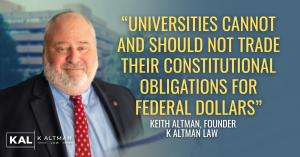Universities Decline to Sign Proposed Higher Education Compact
Conditioning federal funding on adoption of specific ideological policies may invite judicial scrutiny under the First Amendment and the doctrine of unconstitutional conditions”
FARMINGTON HILLS, MI, UNITED STATES, October 29, 2025 /EINPresswire.com/ -- Several major universities have announced they will not sign the U.S. Department of Education’s proposed “Compact for Academic Excellence in Higher Education,” a document circulated to nine institutions on Oct. 1 that would condition preferential access to certain federal funding and programs on a series of policy commitments. By Oct. 20, leaders of seven institutions — including the University of Arizona (UA), Dartmouth College, the University of Virginia (UVA), Brown University, the University of Southern California (USC), the University of Pennsylvania, and the Massachusetts Institute of Technology (MIT)- had publicly declined to sign the compact[1].— Keith Altman
The draft compact outlines a 10-point agenda that asks participating universities to adopt biology-based definitions of gender, restructure or abolish departments perceived to punish conservative ideas, restrict admission of students from certain countries, freeze tuition rates, and commit to aligning institutional policies with federal priorities. In exchange, the institutions would receive preferential consideration for federal research grants, student loans, visa approvals, and other forms of federal support[2].
In a letter to the UA community on Oct. 20, President Suresh Garimella said the university had not agreed to the compact and had instead submitted a statement of principles to the Department of Education. Dartmouth President Sian Leah Beilock wrote on Oct. 18 that she did not believe a compact with any administration was the right approach to achieve academic excellence and cautioned that such an agreement could compromise academic freedom and local governance. Interim UVA President Paul Mahoney stated that federal research funding should be based on merit and noted that UVA’s response reaffirms its core values and commitments. Brown University, USC, and the University of Pennsylvania released similar statements emphasizing that they would not enter into an agreement that could infringe on academic freedom or civil rights protections.
Not all institutions have responded uniformly. Vanderbilt University said it remains open to discussions about the proposal, while the University of Texas at Austin had not formally replied to the invitation as of the Oct. 20 deadline. Higher education experts interviewed by local media characterized the compact as an unusual request that, if enacted, could shift the balance between federal oversight and institutional autonomy. Faculty and student groups have urged university leaders to prioritize constitutional free speech rights and local decision-making over the potential funding advantages offered in the draft.
The compact’s conditions raise legal questions because public and private universities receiving federal funding must comply with existing statutes, including Title IX of the Education Amendments Act of 1972, which prohibits sex discrimination, and the First Amendment, which protects freedom of speech and academic inquiry. “Conditioning federal funding on adoption of specific ideological policies may invite judicial scrutiny under the First Amendment and the doctrine of unconstitutional conditions,” said Keith Altman, the founding partner at K Altman Law. “Universities have historically enjoyed significant autonomy in developing curricula and policies. Any policy that ties funding to the abandonment of inclusive practices or the recognition of transgender students as women could conflict with Title IX and established equal protection principles.”
As of this writing, no university has signed the compact. The Department of Education has indicated that it will continue discussions with institutions that have not formally responded. Observers expect further debate in the weeks ahead as universities weigh the potential benefits of the proposal against concerns about academic freedom and civil rights compliance.
Keith Altman
K Altman Law
+1 888-984-1341
kalonline@kaltmanlaw.com
Visit us on social media:
LinkedIn
Instagram
Facebook
YouTube
TikTok
X
Legal Disclaimer:
EIN Presswire provides this news content "as is" without warranty of any kind. We do not accept any responsibility or liability for the accuracy, content, images, videos, licenses, completeness, legality, or reliability of the information contained in this article. If you have any complaints or copyright issues related to this article, kindly contact the author above.


